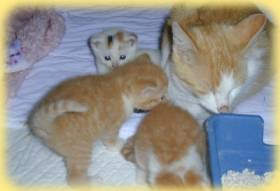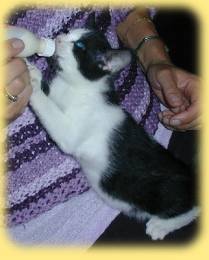*Care for kittens with
a mother:
The best scenario is when mother
and kittens are still together. If all is right mother will take care of
their feeding and education. Sometimes she needs a little help, and the
kittens will need some extra bottle-feeding. See the last part of the chapter
called Delivery. Kittens will drink
with their mother untill they're about 6 weeks old, and then they'll turn
away from her milk and eat independently.
There is further information at
the bottom of this page, which will also partly apply to kittens wíth
a mother. Also there's a growth chart
on this site.
When can kittens leave the litter
and why?
The mother will provide the best
education and socialization for the kittens. Kittens with a very social
mother are usually more balanced and inquisitive. They will learn all about
grooming and litterbox-use. They are more obedient and can be corrected.
If brothers and sisters are still present, kittens learn how to share and
play, and how to groom each other.
Here in the Netherlands it's legally
prohibited to separate them before 7 weeks of age, whether they still have
a mother or not. Reading about the interaction between mother and siblings,
it's easy to understand how important it is to keep them together, and
not let them go to another home until they're 12 weeks old.
Leaving the litter is a difficult
time for kittens. Taken away from their wellknown environment they'll miss
their siblings and mother. This means a lot of stress, which will weaken
their immune-system. By placing them in another environment they will have
to deal with new germs they have no resistance against. That's why kittens
often get sick when they have not been vaccinated.
We feel it's very important to vaccinate
(= 2nd vaccination) before the kittens leave the litter. See to it that
you receive a vaccination passport with the 1st vaccination, and have the
2nd vaccination entered in there as well.
Because a vaccination may cause
a reaction, especially in times of stress, it would even be better to wait
one more week until the 13th week to let a kitten leave. Also let the new
care-giver know what food the kitten is used to, and how it is fed, to
prevent intestinal problems.

mama Charmin & kids
|
*Care for kittens without
a mother:
It's a worrisome situation when
there's no mother to care for the kittens: she may have died, or she may
be present but absolutely ignore her babies.
Or: the litter may have been found
without a mother.
If you have found such a litter,
please look here at the chapter Dumped Kittens
to find out what you should do. In case you have to take the kittens home
with you because you can't get help from the Animal Protection Service,
here is some information about their care:
-
Small kittens from 0 to 4 weeks old
can't eat or drink independently.
-
Just born kittens have to be bottle-fed
every
2 hours, day and night
-
The bottle-feeding has to be done with
special milk, like KMR or Lactol. It depends on where you are on how you
can get this substitute-nursing milk. Ask the vet or a nearby breeder.
See Bottle-feeding chapter
-
Attention: don't use regular (cow)milk:
it contains too much lactose and causes intestinal problems.
-
At birth a kitten weighs approximately
100 grams.
-
Kittens have to be kept warm with hotwater
bottles or bags. Watch out for hypothermia. See Bottle-feedingchapter.
-
The umbilical cord falls off by itself
between the 3rd and 5th day
-
At birth a kitten can't see nor hear.
-
Eyes and ears will open between the
9th and 12th day.
-
The first teeth will appear at around
3 weeks of age.
-
Kittens will start eating independently
at around 4 weeks of age. Start with a little Nutrix rice pudding. Bottle-feeding
will still be necessary. It may be possible that kittens - like the one
in the picture below - will only accept the bottle and not the pudding.
Warning: never give Brinta (wheat product) which has too much fiber
and can cause diarrhea. Give only easily digestible porridge like Nutrix,
mixed with Litterlac, KMR or Lactol.
-
Start litterbox-training at the age
of 4 weeks, no matter if there's a mother around or not, because she will
often stop licking the kittens clean as soon as the kittens start eating
different foods. After every feeding put the kittens in the special small
kitten litterbox with the low entry. The litter must be very fine, and
absolutely
non-clumping. This is important in case a kitten eats some of the litter
which may then clump in its digestive system.
-
When they're 6 weeks old they can start
eating dry kitten kibble soaked in some water and Whiskas for kittens.
|


